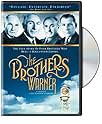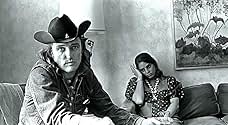An intimate portrait and saga of four film pioneers--Harry, Albert, Sam and Jack who rose from immigrant poverty through personal tragedies persevering to create a major studio with a social... Read allAn intimate portrait and saga of four film pioneers--Harry, Albert, Sam and Jack who rose from immigrant poverty through personal tragedies persevering to create a major studio with a social conscience.An intimate portrait and saga of four film pioneers--Harry, Albert, Sam and Jack who rose from immigrant poverty through personal tragedies persevering to create a major studio with a social conscience.
- Awards
- 1 nomination total
- Self
- (as Sam Goldwyn Jr.)
- Self
- (as Roy Disney Jr.)
- Self - Historian
- (as Dr. Michael Birdwell)
- Director
- Writer
- All cast & crew
- Production, box office & more at IMDbPro
Featured reviews
However, there is no denying that this doc is entertaining. Sibling rivalry is something to which the vast majority of us can relate and when it is presented, as it is here, in all its show biz luridness, with lots of stabbings in the back, mistresses, wives, aneurisms, strokes and tragic deaths, it makes for a fun hour and forty five.
Did I mention that the director is Harry's grand daughter? Give it a B minus.
The brothers were as different as any four people could be - the outlandish Jack, the good businessman Harry, the kind-hearted Sam, and the quiet Albert - but the main characters are Jack and Harry.
Naturally, since this is done by a family member, the emphasis is on the positive aspects of the studio - the risk-taking to get into sound, the tough social topics the studio tackled, their work against Naziism before World War II, and their wartime contributions. The difficulties with Sam Warner's widow, Lina Basquette, are soft-pedaled. It is noted that Sam's and Lina's child was taken from her and raised by the Warners. If that strikes people as odd, it's because it's not mentioned how much power and influence the family wielded against an actress. What also isn't mentioned is that the Warners had Lina blacklisted, and she never met her daughter until she reached adulthood.
Another thing left out is exactly how Sam Warner acquired Vitaphone, but it's possible that Cass Warner doesn't know the story. The anti-Semitism was rampant in Hollywood in the '20s, and in fact, Joseph Kennedy was one of the people determined to get the Jews out of the film-making business. Therefore, when Sam, who was a big redheaded guy, went to meet the Vitaphone people, he asked Lina to wear her Catholic cross. Unaware that Sam was Jewish, Warner Brothers was able to acquire Vitaphone.
No words are minced regarding Jack's ultimate betrayal of brother Harry and his whole family, a very shocking and sad page in the family scrapbook.
Some of the people interviewed include Lina Basquette, George Segal, Efrem Zimbalist, Jr., Debbie Reynolds, Roy Disney, Sherry Lansing, film historian Jeanine Basinger, Dennis Hopper, Tab Hunter, and ex-staff members at Warner Brothers - all very good and insightful.
Jack Warner used to call Raoul Walsh into his office and moan to him that he needed him to direct a film. Who's in it? Walsh would ask, and Warner would answer, "some bum." That's probably what he thought of his actors in general; unfortunately, he seemed to view his family the same way. A fascinating story and highly recommended.
The four brothers built an empire American style, one of the most successful enterprises in one of the most successful American industry of the 20th century. Yet, their path was not smooth, their life was milestoned by happiness and tragedies as well, and they were no saints. Grand-daughter Cass Warner's film has both the qualities of bringing a lot of information backed-up by original film sequences, and of bringing a personal touch, with interviews of the members of the family, as well as important people in the industry, and film and communication experts. I appreciated the participation of descendants and representatives from the competitor studios like Disney or Paramount who did not hesitate to participate in this homage documentary. All parts are well dosed and the balanced mix takes us through six decades of movie making in parallel with the American history, actually part of the American history of the 20th century.
The documentary is informative, good, and human, and seldom falls into the trap of the blind adoration of its subject. The story of the brothers Warner and of Warner Brothers the corporation is the material for a great feature film, yet to be made in the future. With a bit of luck it will add a few Oscars near the Warner Brothers name.
Cass Warner is the filmmaker and the granddaughter of Harry. Jack is the youngest, the last survivor, and the most famous. It's very compelling to learn about the brothers. It's fun to see a few recognizable faces who talk about the old times with the Warners. I'm not expecting too many deep dark secrets with a family member behind the camera, but there is some juicy family dysfunction. There are moments of interest depending on the viewer. I like the cartoons. Most of the company stuff isn't much to me. The war years including pre-war and post-war are very interesting. The big drama is the family drama. It's interesting to have Jack Warner seeing himself as the James Dean characters. I never considered that. All in all, this is very informative and we finally have a name.
Did you know
- TriviaIn the film clip from Casablanca a line is spoken which isn't in the film. The clip is from the end of Casablanca, at the airport, Richard Blaine (Humphrey Bogart) tells Major Heinrich Strasser (Conrad Veidt), "Alright Major, you asked for it" before he shoots him. The actual movie simply has Major Strasser pulling his gun and Rick shooting him.
- GoofsCass Warner Sperling's commentary states that the 1927 film "The Jazz Singer," starring Al Jolson, grossed more than any movie made to that time and remained the all-time box-office champ until the release of "Gone With the Wind." It was actually Jolson's next film, "The Singing Fool," that set the box-office record that lasted until "Gone With the Wind."
- Quotes
Self - Harry Warner's granddaughter, also narrator: The truth is, they were a phenomenal team that built an empire on a dream and revolutionized Hollywood while making the most classic, relevant movies of their time.
- ConnectionsFeatures The Great Train Robbery (1903)
- SoundtracksMe, Myself & I
Written by David Campbell (as David Campbell)
Performed by Ernest S. Llab and Bettie Ross
By Arrangement with DRC Music
Details
- Runtime
- 1h 34m(94 min)
- Color
- Aspect ratio
- 1.78 : 1

































